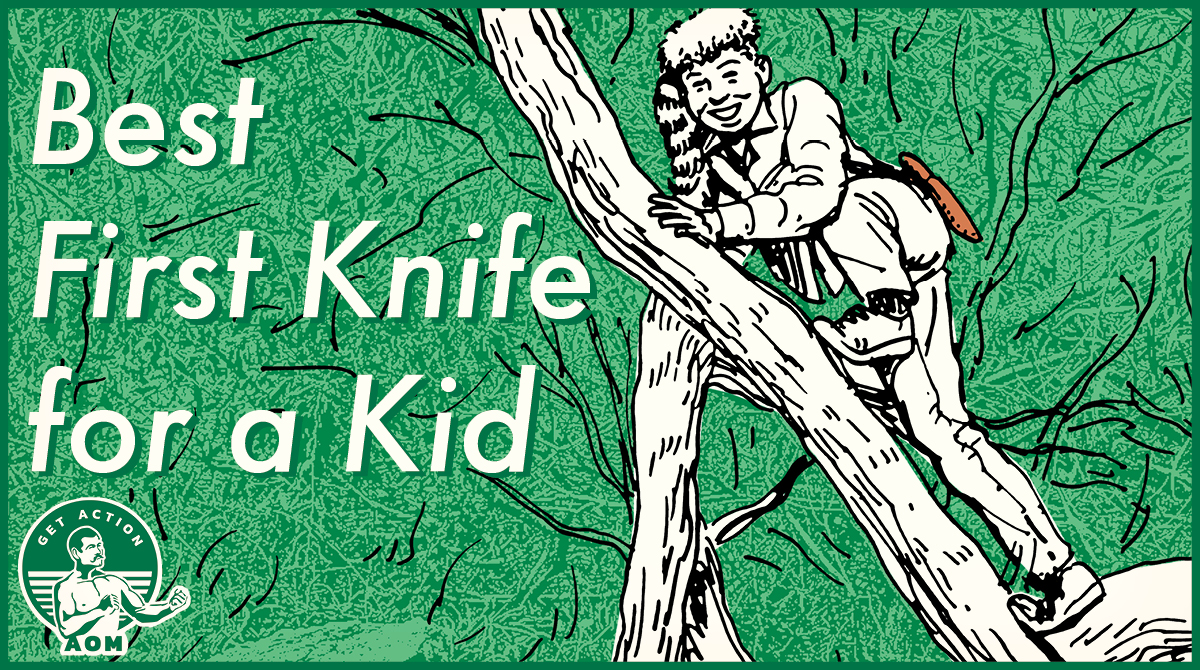
Editor’s Note: This excerpt is from The Young Adventurer’s Guide to (Almost) Everything — a book addressed to kids.
The Most Important Tool You’ll Own
It wasn’t so long ago that most kids were given a knife at some point before their tenth birthday, taught how to use and care for it, and, perhaps most importantly, were trusted with it. In many instances, this was the same knife a child’s parent or grandparent had used, and handing it down across the generations was part of the family’s legacy.
Of course, these days most kids don’t live on farms or even in the country, and the need for children—or adults, for that matter—to carry a sharp cutting implement isn’t what it was. But once your start rediscovering “old-fashioned” outdoor projects—from building fires and forts to crafting wooden whistles and baskets—you’ll find more uses for a knife than you can shake a stick at.
Choosing a Knife
Fixed Blades
Most people think of a pocketknife as the best knife for a kid, but truth is, the safest, most useful knife is one with a fixed blade in a belt sheath. Thanks to its lack of moving parts, a fixed-blade knife does not fold or slide and is typically stronger due to the tang, which is the extension of the blade into the handle. With a fixed-blade knife, there is no chance of it folding on your fingers when you least expect it. As a bonus, these knives are usually more comfortable to hold and work with.
We get most of our knives from Ragweed Forge, through the website www.ragweedforge.com, and especially recommend the Mora knives made in Sweden. They are made with Swedish steel and skilled craftsmanship and are the best bang for your buck around. They are simple and easy to sharpen (although they come from the factory very sharp). For fourteen bucks, you can get one of the “Classic Mora†knives, which comes with a plastic sheath that goes on your belt and will last you a lifetime (if you don’t lose it!). The site also offers more expensive leather sheath options, or you can, of course, make your own sheath. If you are new to using knives, the Classic Mora can be purchased in a version with a blade guard so your hand cannot slip down the handle onto the blade.
If you think you will be mostly carving with your knife, look in the wood-carving section of the Mora catalog and you will find #106, a knife that is narrower and pointed and our favorite for that purpose.
Lastly, Ragnar at Ragweed Forge is super accommodating and happy to answer questions, so don’t be shy.
Folding Pocketknives
We know that no matter what we say here, some of you will disÂregard the sage advice of your elders and get yourselves a pocketÂknife. That’s okay, you’re young; every so often, you’re supposed to disregard the sage advice of your elders. Here’s what we recommend when it comes to pocketknives:
Locking blade. Don’t get a knife without it. These knives have a mechanism that locks the blade in its fully opened position. The lock must be released before the knife can be folded, eliminating accidenÂtal closures.
Quality. Don’t get a cheap junker. It seems like you’ve gotta throw down at least thirty bucks for anything decent, and the $35 to $65 range has a heck of a lot more options.
Simplicity. Get a sinÂgle midsized blade. Big and small blades are harder to control and less versatile. Those pocketknives with all kinds of gadgets that try to prepare you for the zombie apocalypse always comÂpromise on something—if you don’t lose comfort in the hand, you might end up with enough weight to drag your pants down around your ankles.
Not to beat a dead horse, but a fixed blade solves all those issues, no muss, no fuss. Don’t say we didn’t warn ya!
__________________________
Excerpted from The Young Adventurer’s Guide to (Almost) Everything by Ben and Penny Hewitt © 2019 by Ben and Penny Hewitt. Illustrations by Luke Boushee. Reprinted in arrangement with Roost Books, an imprint of Shambhala Publications, Inc.


